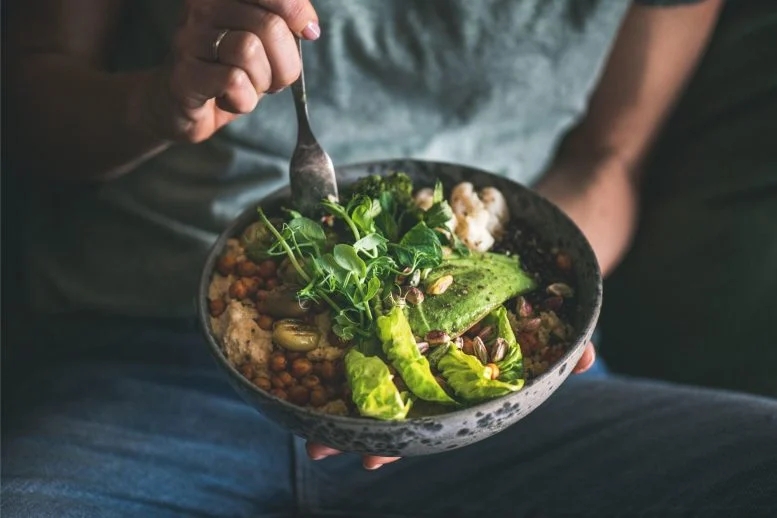博文
吃植物,战胜癌症:新的研究表明蔬菜可以降低患前列腺癌的风险  精选
精选
||
吃植物,战胜癌症:新的研究表明蔬菜可以降低患前列腺癌的风险
诸平
据美国加州大学旧金山分校(University Of California - San Francisco简称UCSF)2024年6月2日提供的消息,吃植物,战胜癌症:新的研究表明蔬菜可以降低患前列腺癌的风险(Eat Plants, Beat Cancer: New Study Links Vegetables To Lower Prostate Cancer Risks)。
加州大学旧金山分校的研究表明,患有局限性前列腺癌的男性可以通过采用富含水果、蔬菜、坚果和橄榄油的植物性饮食,将疾病进展的风险降低47%。超过2000名参与者表明,增加植物性食品的消费和减少动物产品的摄入可以显著改善健康状况,并有可能延缓或预防前列腺癌的进展。每天增加水果、坚果和蔬菜的摄入量,同时减少动物产品的摄入量,与前列腺癌进展风险降低近50%有关。
根据加州大学旧金山分校的一项新研究,患有前列腺癌的男性可以通过增加水果、蔬菜、坚果和橄榄油的摄入量来显著降低疾病进展的风险。一项针对2000多名患有局限性前列腺癌的男性的研究发现,与食用最多动物产品的人相比,以植物性饮食为主的人癌症进展的风险降低了47%。相关研究结果于2024年5月1日已经在《美国医学会杂志网络开放》(JAMA Network Open)杂志网站发表——Vivian N. Liu, Erin L. Van Blarigan, Li Zhang, Rebecca E. Graff, Stacy Loeb, Crystal S. Langlais, Janet E. Cowan, Peter R. Carroll, June M. Chan, Stacey A. Kenfield. Plant-Based Diets and Disease Progression in Men With Prostate Cancer. JAMA Network Open, 2024, 7(5): e249053. DOI: 10.1001/jamanetworkopen.2024.9053. Published: May 1, 2024. https://jamanetwork.com/journals/jamanetworkopen/fullarticle/2818122
参与此项研究的除了来自美国加州大学旧金山分校的研究人员之外,还有来自英国伦敦门威尔有限公司(Menwell Limited, London, England, United Kingdom)、纽约大学和曼哈顿退伍军人事务部(New York University and Manhattan Veterans Affairs, New York)以及美国达勒姆的艾昆纬现实世界的解决方案(Real World Solutions, IQVIA, Durham, North Carolina)的研究人员。艾昆纬是美国一家生物制药开发和商业外包服务提供商。
以植物性饮食为主相当于每天多吃一到两份健康食品,特别是蔬菜、水果和全谷物,同时少吃动物产品,如乳制品和肉类。这项研究对这些中位年龄为65岁的男性进行了长期跟踪调查,以了解饮食因素如何影响他们癌症的进展。植物性饮食包括水果、蔬菜、全谷物、坚果、豆类、植物油、茶和咖啡。研究人员使用以植物为基础的指数来测量摄入量,并将得分最高的20%的男性与得分最低的20%的男性进行比较。
UCSF 奥舍综合健康中心(UCSF Osher Center for Integrative Health)前首席临床研究协调员、上述研究论文的第一作者维维安·刘(Vivian N. Liu)说,“这些结果可以指导人们在整个饮食中做出更好、更健康的选择,而不是增加或减少某些食物。”
她说:“进展到疾病晚期是前列腺癌患者、他们的家人、护理人员和医生最关心的问题之一。这增加了许多其他与食用植物性饮食相关的健康益处,例如减少糖尿病、心血管疾病和总体死亡率。”
抗氧化剂和抗炎化合物(Antioxidants and anti-inflammatory compounds)
植物性饮食在美国越来越受欢迎,越来越多的证据表明,它们对前列腺癌患者有益。前列腺癌是美国男性中仅次于非黑色素瘤皮肤癌(non-melanoma skin cancer)的最常见癌症。
水果和蔬菜含有抗氧化剂(antioxidants),以及抗炎化合物(anti-inflammatory compounds),已被证明可以预防前列腺癌,先前的研究一直表明饮食因素对整体健康和福祉的重要性。
加州大学旧金山分校的泌尿学教授、泌尿系癌症人口科学海伦·迪勒家族主席(Helen Diller Family Chair in Population Science for Urologic Cancer)、上述论文通讯作者史黛丝·肯菲尔德(Stacey A. Kenfield)博士说:“每天在饮食上做一些小小的改变是有益的。前列腺癌确诊后多吃植物性食物,最近的研究显示与更好的生活质量有关,包括性功能、泌尿功能和活力,所以这在两个层面上都是双赢的。”
本研究获得了前列腺癌基金会颁发的青年研究者奖(Young Investigator Award from the Prostate Cancer Foundation)、美国纽约州卫生部(New York State Department of Health)、崔西娅和迈克尔·伯恩斯(Tricia and Michael Berns)、史蒂文及克里斯汀·伯德·西夫韦杰出教授(Steven & Christine Burd Safeway Distinguished Professorship)和泌尿系统癌症人口科学海伦·迪勒家族主席(Helen Diller Family Chair in Population Science for Urologic Cancer)的支持或资助。前列腺癌战略泌尿学研究努力(Cancer of the Prostate Strategic Urologic Research Endeavor简称CaPSURE)得到了美国国防部{Department of Defense (grant No. W81XWH-13-2-0074 and W81XWH-04-1-0850)}、前列腺癌基金会(Prostate Cancer Foundation)、TAP制药(TAP Pharmaceuticals)、国家癌症研究所癌症中心{National Cancer Institute Cancer Center Support (grant No. P30 CA 82103-18)}以及转化癌症生物学领域的高柏·贝尼奥夫计划(Goldberg Benioff Program in Translational Cancer Biology)的支持或资助。
上述介绍,仅供参考。欲了解更多信息,敬请注意浏览原文或者相关报道。
Importance Plant-based diets are associated with many health and environmental benefits, including primary prevention of fatal prostate cancer, but less is known about postdiagnostic plant-based diet patterns in individuals with prostate cancer.
Objective To examine whether postdiagnostic plant-based dietary patterns are associated with risk of prostate cancer progression and prostate cancer–specific mortality.
Design, Setting, and Participants This longitudinal observational cohort study included men with biopsy-proven nonmetastatic prostate cancer (stage ≤T3a) from the diet and lifestyle substudy within the Cancer of the Prostate Strategic Urologic Research Endeavor (CaPSURE) enrolled at 43 urology practices across the US from 1999 to 2018. Participants completed a comprehensive diet and lifestyle questionnaire (including a validated food frequency questionnaire [FFQ]) between 2004 and 2016. Data were analyzed from August 2022 to April 2023.
Exposures Overall plant-based diet index (PDI) and healthful plant-based diet index (hPDI) scores were calculated from the FFQ.
Main Outcomes and Measures The primary outcome was prostate cancer progression (recurrence, secondary treatment, bone metastases, or prostate cancer–specific mortality). The secondary outcome was prostate cancer–specific mortality.
Results Among 2062 participants (median [IQR] age, 65.0 [59.0-70.0] years), 61 (3%) identified as African American, 3 (<1%) identified as American Indian or Alaska Native, 9 (<1%) identified as Asian or Pacific Islander, 15 (1%) identified as Latino, and 1959 (95%) identified as White. Median (IQR) time from prostate cancer diagnosis to FFQ was 31.3 (15.9-62.0) months after diagnosis. During a median (IQR) follow-up of 6.5 (1.3-12.8) years after the FFQ, 190 progression events and 61 prostate cancer–specific mortality events were observed. Men scoring in the highest vs lowest quintile of PDI had a 47% lower risk of progression (HR, 0.53; 95% CI, 0.37-0.74; P for trend = .003). The hPDI was not associated with risk of progression overall. However, among 680 individuals with Gleason grade 7 or higher at diagnosis, the highest hPDI quintile was associated with a 55% lower risk of progression compared with the lowest hPDI quintile (HR 0.45; 95% CI, 0.25-0.81; P for trend = .01); no association was observed in individuals with Gleason grade less than 7.
Conclusions and Relevance In this cohort study of 2062 men with prostate cancer, higher intake of plant foods after prostate cancer diagnosis was associated with lower risk of cancer progression. These findings suggest nutritional assessment and counseling may be recommended to patients with prostate cancer to help establish healthy dietary practices and support well-being and overall health.
https://blog.sciencenet.cn/blog-212210-1436629.html
上一篇:阿尔茨海默病的突破:研究人员发现了可能阻止疾病进展的新方法
下一篇:20年的难题解决了:物理学家揭示了零维铁电体的三维漩涡
